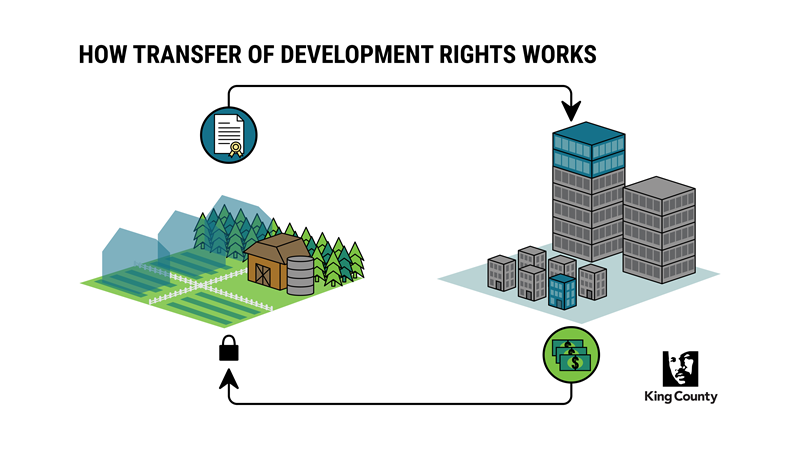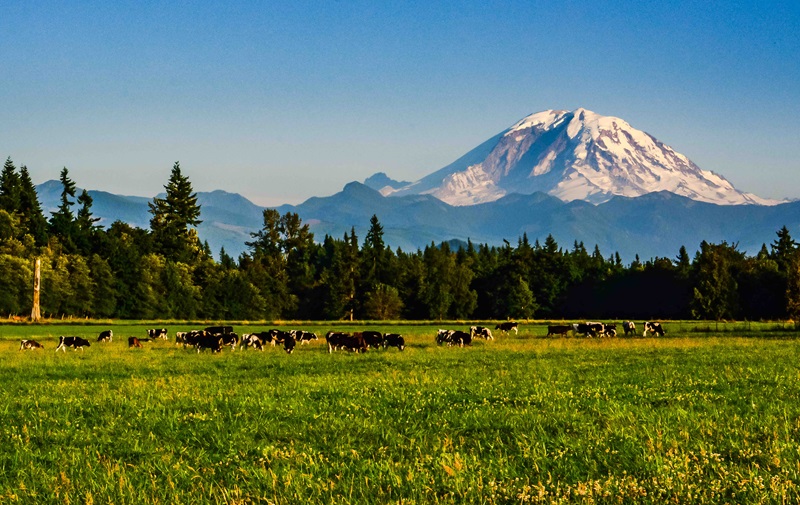Transfer of Development Rights Program Overview
The right to develop land for residential or commercial purposes is one of a bundle of rights associated with land ownership. The County’s Transfer of Development Rights (TDR) Program allows landowners of designated sending sites to separate the right to develop land from the bundle of other property rights. Sending sites are rural or resource lands with farm, forest, open space, or regional trail amenities, and in some cases, urban land with conservation values.
Through TDR, the separated right(s) are turned into a tradable commodity that can be bought and sold – just as land can be bought and sold. When a landowner chooses to separate some, or all, development rights, the property is conserved through a permanent conservation easement. A conservation easement can act to reduce landowner property taxes. Landowners can retain development rights on their property for future use and the land remains in private ownership.
These transferable development rights or “TDRs” are typically bought by developers of designated receiving sites. Receiving sites are typically properties in urban areas eligible for increased density. The purchased TDRs give developers the ability to build additional houses, lots, or floor area that exceed the base density allowed by zoning, or to gain other non-density bonus.

The Program is based on free-market principles and prices that would motivate landowner and developer participation. Rural landowners realize economic return through the sale of development rights to private developers who are able to build more efficiently in designated unincorporated urban areas and partner cities.
The market for development rights allows rural landowners to realize a portion of their property value without having to sell or fully develop their land. Developers receive a higher return from purchasing development rights by increasing the value of their projects. TDRs have several non-density uses and benefits, as well
For information about TDR prices, transactions, and market trends, see TDR Market Information. To buy or sell TDRs, go to the TDR Exchange.

Benefits and uses of TDRs
If you are a developer interested in buying development rights for additional density in a project, the receiving site criteria will help to determine eligibility and maximum additional density you may qualify for through TDR. In addition to providing additional density at development projects, there are several alternative uses for TDRs.
Check out the TDR Brochure for more information about how TDRs can benefit development projects.
If you are a landowner interested in enrolling your property in the TDR Program as a sending site, review sending site criteria to see if your property is eligible to enroll, review the TDR enrollment process, and then download a TDR Program application. It is also possible to reduce your property taxes by transferring TDRs.
The TDR Program also has benefits for residents of King County:
- Land that is important to the health of the local environment and the well-being of County residents is protected through the private market.
- Land is permanently protected and remains in private ownership and is managed by private landowners; and
- Landowners can continue to farm, manage forestland, or keep their property in open space.
- Growth is focused into urban areas and away from rural and resource areas.
- This creates more efficient development patterns and makes use of urban infrastructure to reduce the amount of development in the County’s rural and resource lands;
- TDR acts to reduce and minimize the significant costs to the County of providing services to rural development located far from urban services; and
- The TDR for Affordable Housing Pilot Program incentivizes increased density in certain types of projects, and the inclusionary housing bonus also combines TDR with affordable housing for higher densities in unincorporated urban King County
Since 1998, the King County TDR Program has protected over 148,000 acres of rural and resource lands (more than 230 square miles) from development by transferring over 3,000 potential dwelling units out of the County’s rural landscape and into its urban areas.
For more detailed information about the Program visit the King County TDR Code (KCC 21A.37).
To help you understand and participate in the TDR market, the King County TDR program offers:
- Sales data and market activity for all TDR transactions in tabular format.
- The King County TDR Exchange, which allows you to browse TDRs for sale, find buyers in search of TDRs, and post for sale and wanted listings.
- Detailed information about buying and selling TDRs

 Translate
Translate